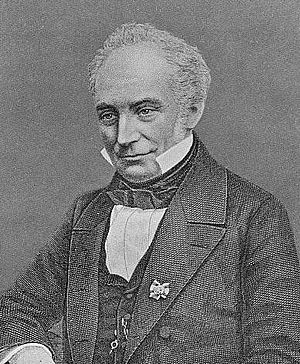Franz Bopp facts for kids
Quick facts for kids
Franz Bopp
|
|
|---|---|
 |
|
| Born | 14 September 1791 |
| Died | 23 October 1867 (aged 76) Berlin, Province of Brandenburg
|
| School | Romantic linguistics |
| Institutions | University of Berlin |
| Notable students | Wilhelm Dilthey |
|
Main interests
|
Linguistics |
|
Notable ideas
|
Comparative linguistics |
|
Influences
|
|
|
Influenced
|
|
Franz Bopp (born September 14, 1791 – died October 23, 1867) was a German linguist. A linguist is someone who studies languages. Bopp is famous for his important work comparing many different languages, especially those in the Indo-European family. He helped us understand how these languages are related.
Contents
Early Life and Education
Bopp was born in Mainz, a city in Germany. Because of political problems in Mainz, his family moved to Aschaffenburg. There, he received a good education at the Lyceum.
A teacher named Karl Joseph Hieronymus Windischmann sparked Bopp's interest in languages and writings from the East. This included ancient languages like Sanskrit, which is a sacred language of Hindus in India. A book by Friedrich Schlegel also greatly influenced Bopp's interest in Indian languages.
Studying Languages in Paris
In 1812, Bopp traveled to Paris, France, to study Sanskrit more deeply. The Bavarian government helped pay for his studies. In Paris, he met many important scholars who also studied languages.
He spent five years studying hard in Paris libraries. He had access to many Sanskrit books and old writings. He focused completely on his studies, even though there was a lot of political unrest around him, like Napoleon's escape and the Battle of Waterloo.
First Major Work
Bopp's first important paper came out in 1816. It was called On the Conjugation System of Sanskrit in comparison with that of Greek, Latin, Persian and Germanic. In this book, Bopp started on the path that would define his life's work.
Other scholars had already noticed that languages like Sanskrit, Persian, Greek, Latin, and German were similar. But Bopp wanted to go further. He aimed to find the common origin of their grammatical forms, like how verbs change. This was a new idea and helped create the field of historical linguistics.
Moving to London and Berlin
After a short time in Germany, Bopp went to London. There, he met more important scholars and became friends with Wilhelm von Humboldt, a Prussian ambassador. Bopp even taught Sanskrit to Humboldt.
In 1820, Bopp published an essay called "Analytical Comparison of the Sanskrit, Greek, Latin and Teutonic Languages." In this work, he expanded his ideas about comparing grammatical forms to all parts of language, not just verbs. He also edited and translated parts of the Mahabharata, a famous ancient Indian epic.
In 1821, Bopp was offered a special job. He became a professor of Sanskrit and comparative grammar at the University of Berlin. He stayed in this position for the rest of his life and also became a member of the Royal Prussian Academy.
Developing Comparative Grammar
Bopp's most important work was his Comparative Grammar. It was published in several parts between 1833 and 1852. The full title was Comparative Grammar of Sanskrit, Zend [Avestan], Greek, Latin, Lithuanian, Old Slavonic, Gothic and German.
In this huge work, Bopp had three main goals:
- To describe the original grammar of these languages by comparing them.
- To understand how their sounds changed over time.
- To find out where their grammatical forms came from.
Bopp's research was very thorough. He used the best information available and kept adding new discoveries. He wrote many other essays on different languages, including the Celtic languages, Old Prussian, and Albanian. He was the first linguist to show that Albanian is a separate branch of the Indo-European language family.
Bopp's work was incredibly important for the study of languages. He helped us understand how languages are related and how they have changed over thousands of years.
See also
 In Spanish: Franz Bopp para niños
In Spanish: Franz Bopp para niños
 | Calvin Brent |
 | Walter T. Bailey |
 | Martha Cassell Thompson |
 | Alberta Jeannette Cassell |

